- Home
- William Golding
The Scorpion God: Three Short Novels Page 15
The Scorpion God: Three Short Novels Read online
Page 15
Mamillius was dressed in armour. His breastplate flashed from a multitudinous and highly allegorical assembly of heroes and centaurs. A scarlet cloak dropped down his back to his heels. The red leather of his sword scabbard matched exactly the red leather openwork of the boots that reached nearly to his knees. The breastplate was matched in material and complexity by the brass helmet that he carried under his left arm.
The Emperor closed his eyes for a moment and spoke faintly.
“Bellona’s bridegroom.”
Mamillius seemed to collapse a little. He blushed.
“I thought—as we were going to the army—”
The Emperor surveyed the details of the uniform.
“I see that both Troy and Carthage have fallen.”
The blush came and went, came again with a profuse perspiration.
“Do you know whose warship these are?”
“I—”
The Emperor rested his forehead on one hand.
“In the circumstances, a distaff would have been less open to misconstruction.”
Always Mamillius kept the wall of his cloak between him and the women. He saw the gold and scarlet banner shake as the warship came alongside the trireme. Her ram lay alongside the barge. This time the colour left his face and did not return.
“What shall we do?”
“There is no time to do anything. Perhaps you might put your helmet on.”
“It gives me a headache.”
“Diplomacy,” said the Emperor. “He has the soldiers—look at them! But we have the intelligence. It will be hard if we cannot smooth things over.”
“What about me?”
“On the whole, I think you would be safer in China.”
The emperor took Mamillius’ hand and stepped ashore. He walked along the quay towards the warship with Mamillius at his heels. The crowd from her deck had flooded the trireme and was flowing across the quay so that the end by the harbour entrance was jammed full. There were prisoners, the abject and supplicating Syrian, slaves. Phanocles wearing an even wilder air of short-sighted bewilderment and soldiers, far too many soldiers. They bore huge bundles and bags that made them look as though they were about to contribute to a gigantic jumble sale. They were tricked out in favours of red and yellow. The loot of a countryside was suspended about them but they came to attention under their loads when they saw the purple fringe on the white toga. The Emperor stopped by the gangway and waited. Behind him the women were crouched by the harbour wall, veiled and terrified like a chorus of Trojan Women. Someone blew a large brass instrument on the warship, there was a clash of arms and the banner was dipped. A tall, dark figure, burly, armed and flashing, and full of intention, came striding down the gangway.
“Welcome home, Posthumus,” said the Emperor, smiling. “You have saved us the trouble of coming to see you.”
3. Jove’s Own Bolt
Posthumus paused for a moment. His gold and scarlet plume waved a foot and a half above the Emperor’s head. His olive-dark and broadly handsome face took on a look of calculation.
“Where have you hidden your troops?”
The Emperor raised his eyebrows.
“There are a few sentries in the garden as usual and possibly a few by the tunnel. Really, Posthumus, you travel with a considerable retinue.”
Posthumus turned aside and spoke briefly among his officers. A detachment of laden legionaries doubled along the quay and stationed themselves between the Emperor and escape. The women wailed then settled to a steady lament. The Emperor affected not to notice but drew Posthumus towards the barge. Amphitrite continued to circle round her anchor slowly.
Posthumus stopped.
“It was high time I came home.”
More thunder. The Emperor looked back at the dense mass of soldiers that filled the end of the quay.
“About a hundred men, I should say. An Imperial Salute?”
Posthumus snorted.
“You can call it that. Presently more ships will enter the harbour. There will be sufficient to ensure that we agree on all points of policy. But what a stroke of luck to find you both on the quay!”
Mamillius cleared his throat and spoke in a high uncertain voice.
“Posthumus, you are mistaken.”
“Mamillius in arms.”
“For show only. I do not want to be Emperor.”
“Ah!”
Posthumus took a step towards him and Mamillius started back, tripping on his cloak. Posthumus poked a finger in his face.
“You may think not. But he would bridge the Adriatic to please you.”
The Emperor flushed a delicate pink.
“You have never wanted my affection, Posthumus, so you have never missed it. If I have been foolish enough to think that I could enjoy his company without more danger than the usual scandal, I have been wise enough to know that you are the best man to rule the Empire—however uncongenial I may find you.”
“I am informed otherwise.”
“At least you might gloss over our differences in public.”
Posthumus paid no attention to these words, but fished a folded paper from inside his breastplate.
“To:
Posthumus, etc., Heir Designate, etc.
From:
CIII
Ships and weapons are being built or converted on the quay next to the tunnel. The Emperor and the Lord Mamillius take much personal interest in a ship, Amphitrite, ex-corn-barge, unclassified, and a tormentum (mark VII) that has been placed on the quay and trained seaward. They are also experimenting with methods of poisoning food on a large scale. Lord Mamillius seems to be in a state of high excitement and anticipation——”
“Posthumus, I swear——”
Posthumus merely raised his voice.
“He is corresponding with the Emperor and others in code under cover of writing poetry——”
Mamillius was flaming.
“Leave my poetry alone!”
“It has not yet been found possible to break this code. Submitted to XLVI; it proved to be composed of quotations from Moschus, Erinna, Mimnermus, and sources not yet identified. Research is proceeding.”
Tears of rage ran down Mamillius’ face.
“You filthy swine!”
“That was unnecessarily cruel, Posthumus.”
Posthumus stuffed the paper back.
“Now we have done with fooling, Caesar. The time has come for a regency.”
“He does not want to be Emperor.”
Posthumus sneered at Mamillius.
“He is not going to be.”
A faint clattering sound came from Mamillius’ armour. The Emperor laid a hand on Posthumus’ arm.
“If the ship and the tormentum worry you, Posthumus, I can explain them rationally. Be fair.”
He turned to the officers and raised his voice.
“Bring the Greek to me.”
Posthumus nodded, waiting. Phanocles stood before them, restoring the circulation to his wrists.
“This man is the root of the matter.”
“Lord Posthumus—I am altering the shape of the world.”
“He has this curious manner of speech, Posthumus.”
“There will be no slaves but coal and iron. The ends of the earth will be joined together.”
Posthumus laughed and the sound cheered no one.
“And men will fly.”
He turned to the officers and beckoned.
“Colonel—why aren’t those ships coming in?”
“Visibility, sir.”
“Damn the visibility. Signal them in or send a message.”
He turned back to Phanocles.
“This fantastic ship——”
Phanocles spread his arms.
“She will go faster than any other. Civilization is a matter of communications.” He frowned at them and searched for simple words. “Lord Posthumus. You are a soldier. What is your greatest difficulty?”
“I have none.”
“But
if you had?”
“Getting there first.”
“You see? Even warfare is a matter of communications. Think of the elaborate efforts Xerxes made to conquer Greece. With Amphitrite he could have crossed the Aegean in a day and against the wind.”
Mamillius struck in, teeth chattering, eager to help.
“Think of the first Caesar, of Alexander, Rameses——”
Phanocles sank his head on one side and opened his hands as if the explanation was simple.
“You see, lord? Communications.”
The Emperor nodded thoughtfully.
“They should be made as difficult as possible.”
Thunder rumbled again. Posthumus strode over to the tormentum and the women shrank away. The roar of the harbour was rising again.
“And this?”
“I have to shut the lightning in the keg. The sting when it strikes anything looses the lightning. Then there is a smoking hole in the ground.”
The Emperor made a sign with two fingers.
“What is the brass butterfly at the base of the sting?”
“It is an arming vane. After the keg has gone some way the butterfly shoots off, otherwise the keg would explode by setback when you fired the tormentum.”
“Would this make a smoking hole where there was a city wall?”
“Yes, Caesar.”
“Where there was an army?”
“If I make the keg big enough.”
Posthumus considered Phanocles closely.
“And this is the only one you have made?”
“Yes, lord.”
“I am not sure whether to have you executed straight away or use you for other purposes.”
“—Execute me?”
Suddenly the roar from the harbour rose till it could no longer be ignored.
They turned together.
It was Amphitrite; they understood that immediately. She had revolved endlessly round her anchor till her flaunted eccentricity had become more than any man could bear who had red blood in his veins. There were naked men plunging from ships and jetties till a hundred arms flashed in the water.
Phanocles cried out.
“What——?”
Posthumus spoke rapidly to the Colonel.
“All troops will disembark on this quay. Meanwhile neither the Emperor nor his suite will wish to leave. See that his wishes are respected. You understand?”
“Sir.”
Posthumus ran to the barge but the Emperor called to him.
“While I am waiting I will inspect these splendid fellows already assembled.”
The colonel glanced at Posthumus, who laughed softly.
“Do as the Father Of His Country tells you.”
The arc of swimmers converged on Amphitrite and the second warship was coming in to the sound of drums. Phanocles clasped his hands.
“Stop them, Caesar!”
Men were swarming now over Amphitrite, tearing at her paddle, striking with any heavy gear they could find at the brass monster in the deck. The guard that Posthumus had put aboard her went down in a whirl of limbs. Smoke rose suddenly from her hold and uncoiled. Naked figures were hurling themselves from her bulwarks while a thin flame, hooded and flickering like a ghost, shot up amidships. The second warship saw the danger and backed water. Oars smashed against the quay but her way was checked. A third ship, emerging from the heat haze crashed into the second with her ram. More oars smashed; then both ships were locked and drifting helplessly down on Amphitrite. Posthumus, screaming curses, leapt into the imperial barge.
“Bear off there! Give way!”
“Detachment ready for inspection, Caesar.”
“Those men between me and the tunnel, Colonel. Let them join the others.”
“My orders, Caesar——”
“Do you not think, Colonel, that you could catch half a dozen women and one old man if they tried to escape?”
The Colonel swallowed.
“This may be the last time the Father Of His Country will inspect his troops. Will you not obey, Colonel? I am a soldier too.”
The Colonel’s Adam’s apple went up and down twice. He swelled with understanding and emotion. He flashed the Emperor an enormous salute.
“Detail to join parade at the double!”
“And the band,” added the Emperor. “I think I see the band there. The band, Colonel?”
A fourth warship was gliding into the harbour. Amphitrite lay, her brass boiler nested in smoke and flame. Her paddle wheels began to lumber round faster. She strained at her cable. They heard a wild scream from Posthumus.
“Back water, curse you!”
Flutes, buccinas, tubas. The brass tube of each lituus was wound round the waist and projected in an elephantine bell over the shoulder. Drums, kettle and bass. Scarlet and gold.
The parade filled the end of the jetty and faced the trireme. The band formed up between the parade and the tormentum. The women wrung their hands. Amphitrite was revolving and flailing up flames and smoke. The fourth warship was trying to circle round her and the other two. But a fifth was about to enter the harbour.
“Band!”
Amphitrite was moving faster. A fathom or two of her cable eased out and she fetched a wider circle, brushed the locked warships so that their rigging flamed. Posthumus was jumping up and down.
“Use your crabs!”
Amphitrite veered another fathom or two of cable. Her circle included the imperial barge which got under way with extraordinary lack of ceremony. Round she went, round and round, with Posthumus screaming and Amphitrite breathing fire down her neck.
The band struck up.
“Open order, Colonel?”
The Colonel quivered.
“There is no room, Caesar. They would step straight down between the quay and the trireme.”
“In that case,” said the Emperor, “they will have to carry their impedimenta and loot or I shall not be able to walk between the ranks.”
The band began to countermarch between the main detachment and the tormentum, ten paces forward, ten paces back. They were splendid. The men were splendid. The seamen were splendid aboard their utterly splendid ships. The women felt the men were splendid and that if they themselves were in danger from General Posthumus it was worth it. Chests swelled, bosoms heaved, and calves quivered. Mamillius put his helmet on.
The Emperor paused by the left-hand man of the first rank.
“And how long have you been in the army, my man?”
Amphitrite’s cable charred through and snapped. Her turning circle became a wide sweep. She touched one of the trots of merchantmen moored by the warehouses and immediately they were dressed overall with flame.
“Somebody use a crab!”
All at once every man in every ship was possessed by one idea—to get out of the harbour. A burning warship limped astern past the end of the quay and the heat from her scorched the parade. Outside Amphitrite’s dreadful arc the water was hidden by ships great and small that fought each other and strove for the safety of the haze-covered sea. Over all this the thunder rolled, dropping bright light into the hills and the band played.
“Where did you get that scar? A jab with a spear? A bottle, eh?”
The legionaires stood rigidly to attention under their sixty-four pounds of brass, their impedimenta, their loot, and the dreadful heat. The Colonel watched a drop of sweat forming on the tip of his nose till his eyes crossed. The Emperor spoke to each man in the front rank.
There was a mess of warships revolving in the centre of the harbour with Amphitrite nuzzling them. The captain of one of them was facing Posthumus at the salute. At that moment either a cable charred through or someone, in blind obedience, used a crab. A black star-shaped hole appeared on the quarter-deck where the captain had been. He went down with his ship.
“How tall are you? Do you like the army? Where did you get that dint from? A slingstone? I should have said a slingstone, shouldn’t you, Colonel? Don’t ever let the Quartermaster
issue you with a new shield, my man. Tell him the Emperor said so. How many children have you got? None? We must arrange some leave after this inspection.”
The word “leave” spread. The legionaries stiffened to endure but already some of them were swaying. The Emperor moved along the front rank with awful deliberation.
“Don’t I remember you from the IXth? In Greece? Why haven’t you been promoted? Look into that, Colonel, will you?”
A second warship was extracting herself from the harbour among a mass of smaller shipping. Amphitrite was bearing down on the harbour mouth in pursuit of the Emperor’s barge.
“What are you going to have done for that boil, my man? Here’s what I call a really impressive fellow. How on earth he can support those three bundles I don’t know. What’s your name?”
Suddenly there was a gap of air in front of the Emperor and a brazen crash. The legionary had passed out.
“As I was saying, we must arrange some leave for them now that the Heir has brought them home to their Father.”
“Caesar——”
“Where did you lose that eye, my man? Don’t lose the other, will you?”
Crash.
Oil was spilling from a warehouse and burning on the water. A thick cloud of black smoke drifted across the parade.
The Emperor spoke softly to the Colonel.
“You see how comedy and tragedy are mingled. Whose orders will you take? These men ought to be putting out the fires.”
The Colonel’s eyes uncrossed for a moment.
“I have my orders, Caesar.”
“Very well. Now, my man, how do you like the army? Has it made a man of you?”
Crash.
“Discipline,” said the Emperor to the right-hand man, “is a great convenience.”
“Caesar?”
“I should have said a splendid thing of course.”
He stood looking down into the sooty water of the harbour entrance. A constant flow of singed traffic was passing before him. The band drowned the language that came from it, but judging from the contorted faces it was complex and personal. Amphitrite and the imperial barge came through almost together.

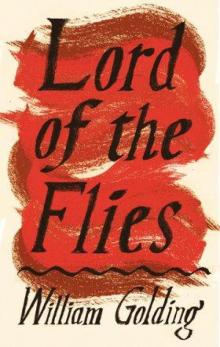 Lord of the Flies
Lord of the Flies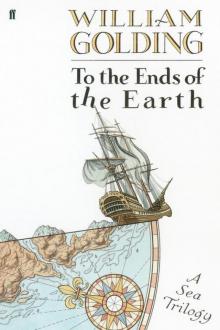 To the Ends of the Earth
To the Ends of the Earth Free Fall
Free Fall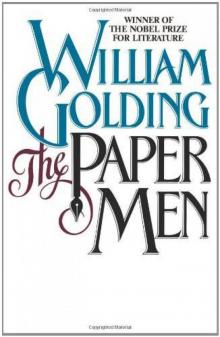 The Paper Men
The Paper Men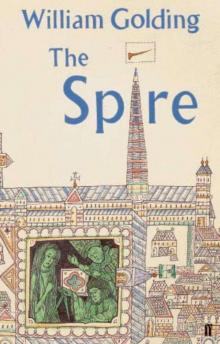 The Spire
The Spire The Scorpion God: Three Short Novels
The Scorpion God: Three Short Novels The Inheritors
The Inheritors Darkness Visible: With an Introduction by Philip Hensher
Darkness Visible: With an Introduction by Philip Hensher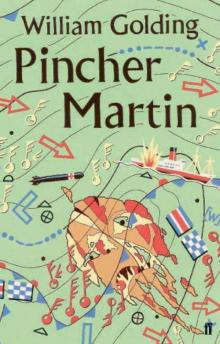 Pincher Martin
Pincher Martin The Pyramid
The Pyramid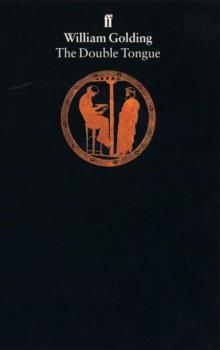 The Double Tongue
The Double Tongue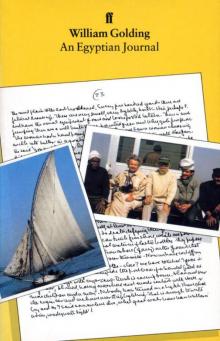 An Egyptian Journal
An Egyptian Journal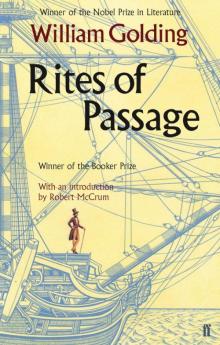 Rites of Passage
Rites of Passage Envoy Extraordinary
Envoy Extraordinary